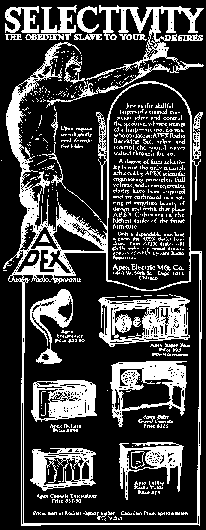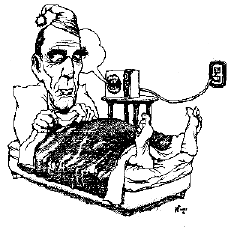&
Why We Make War

RE: Oh yes, there's also the insulting patter of a couple of guys who think my car is so important that I want to hear about it for two hours every Saturday.
I agree that public radio has gone downhill. But it is NOT because of CAR TALK! It is an entertaining and useful show. You can get chamber music on plenty of for-profit radio stations, but you can only get Car Talk on public radio.
You think Car Talk is insulting??? I'll tell you what's insulting --- somebody who equates strength or bravery with male genitalia. It's like praising someone for having Christian virtues in front of an audience that's 50% Jewish. Wake up and join the 21st fucking century.
I thought you might be interested in seeing the Letter to the Editor I just sent to salon.com, re the piece "National Private Radio:
This year marks the 30th anniversary of a countercultural classic: Lorenzo Milam's "Sex and Broadcasting" --- a book that is not simply a principled and impassioned a plea for the public's rights to the public's airwaves, but also among the funniest and most irreverent pieces of American literature yet written.
So it is vaguely disconcerting to see Milam in his righteous anger about the state of public radio ("National Private Radio," July 2) crankily denouncing "Wait, Wait, Don't Tell Me," "Car Talk," and any other NPR program that aspires to humorousness. Surely in Milam's public radio universe there is room for some laughter amid the gut-wrenching accounts of Auschwitz and Selma and the scholarly disquisitions about jazz classics.
Still, Milam has a point, and one that is feebly rebutted by the understandably defensive "Marketplace" founder Jim Russell ("Who are you calling a corporate shill?" July 2). Russell begs the central question when he defends his program's relationship to General Electric, so intimate that GE's jingle is part of the "Marketplace" theme music, by pointing out that the program covers GE as it does any other big company.
That, in fact, is the problem: The very premise of Marketplace --- that greed is good and that the daily doings of humanity should be assessed on public radio according to how competing greed impulses have vindicated themselves --- is profoundly depressing, the more so because it goes unstated and thus unexamined. Marketplace plays a jaunty "We're in the Money" tune every time the markets rise, but it never dares to ask who "we" are and whether "we" deserve the lucre.
The rise of public radio, and the attendant commodification of public radio programming, is best assessed in the context of American radio in its entirety. The wholesale giveaway of the nation's airwaves, such that two corporate giants now dominate commercial radio, has made commercial radio unlistenable by anyone but the rabidly right wing or the seeker of audio anesthesia. If public radio has gone mainstream, it is to fill a vacuum in the center of the culture that used to be occupied by full-service commercial AM stations. Lorenzo Milam and every other American should be cranky about this --- and then rededicate ourselves to finding something on the radio to laugh about.
Donald.M.Kreis@valley.net
 I read your Salon article on NPR, and was reminded of a conversation I overheard while on an Antioch college co-op job at WETA-FM in D.C. WETA then had a TV station and was in the planning phase for the FM station, set to open in a few months.
I read your Salon article on NPR, and was reminded of a conversation I overheard while on an Antioch college co-op job at WETA-FM in D.C. WETA then had a TV station and was in the planning phase for the FM station, set to open in a few months.
The two gentlemen were talking about the nature of non-profit organizations. What would happen if subscriber revenue caused the station to generate a "surplus" or profit? No problem, the other said. We'll just raise salaries.
Even in 1969, WETA was pretty tame. The classical music director mused about a series of documentaries on lobbying corporate interests, but he moved on to New York, and the news director was too busy conducting a flaming affair with another announcer to go beyond rip-and-read newscasting.
In 1972 I was briefly a night engineer for them, watching the board while they broadcast broadway musical sound tracks. I think real public radio needs to work hard to cultivate talent. I'm sorry to say that I tried to volunteer at KRAB in 1978 when I had a lot of time on my hands, but the station personnel were very stand-offish, provided me with no orientation, and when I gave up in frustration, never called me back to find out what my experience was.
never set razor blade to tape again, and have spent the last 23 years running and raising money for community-based human service programs. You and I may share a different set of values than the two gentlemen I overheard in Washington 30 years ago. We need to look the naked ass of reality in the face and recognize that we're in the minority.
That doesn't mean, however, that we don't make a difference. There are still plenty of people out there who don't live their lives compulsively in search of more stuff. Let's hang out with them.
Seeing a good writer do a bad review is a sad thing. Often, like Schwartz attacking John Keegan's War and Our World, they seem to have a good-but-vague idea of why the book is bad, but can't express it very well. In attempting to do so, Schwartz violates the principle of exegetical charity.
The principle of exegetical charity states, loosely, that one should assume that, if a passage can be interpreted in more than one way, it should be interpreted in the manner that strengthens the author's argument most. When you are reading as book by someone you believe isn't stupid, then what they said probably isn't stupid on second glance.
Schwartz has ignored this rule, I believe, in the face of the what seem to be numerous errors of fact and judgment in Keegan's War and Our World. Having not read the book or the Encyclopedia of Military History, I can only go so far. But there are fallacies that stick out regardless of the factual content.
The first buzzing alarm that went off in my head was Schwartz's passage criticizing Keegan's thesis that chivalry began with Christianity. Certainly the code didn't apply to nonwhite Europeans and was often honoured more in the breach, but it was a code nonetheless. The bad is better than nothing. Schwartz's criticisms seem to center around the fact that it was considered to apply only to Christians. From what he's given us of Keegan's argument, this is simply irrelevant.
As for the "small proportion of the people of the world will die for lack of food," well, it's tactless, but it's true: 5,000,000 lives is boundless human grief but, nonetheless, a "small proportion" of the world's population.
"States... cannot make war at wish" is another assertion that Schwartz derides as patently false, when interpreted by his own lights. From where I sit, it looks like a pretty simple innocuous thesis --- states, even the United ones, can't make war as they wish. Certainly there are many arbitrary wars that are the whim of some politician or other. But, even aside from mere logistic or military problems, there are immense political and economic factors restricting military action to a significant degree. Vietnam showed that.
Every year, it seems, a new book comes out saying "we" could have won the war with more men or more money or tactical nuclear weapons. But Johnson was under political constraints and one of these was "Hey, LBJ, how many kids did you kill today?" So it seems that, while Keegan may have made factual errors (I'm inclined to put Keegan on the same footing as the Encyclopedia and call it a draw there), his biggest sin really seems to be unoriginality.
This seems consistent with much of Keegan's recent stuff, watered-down retreads such as The Face of Battle. I'd also say that his statement that "war between large nations is no longer possible" [Schwartz's wording] is not very consistent with his own thesis that war is not a continuation of politics by other means, as laid out in A History of Warfare. But ultimately it seems to me, from what he's given us, Schwartz is attacking Keegan for (mostly) the wrong reasons.
dccarles@calum.csclub.uwaterloo.ca